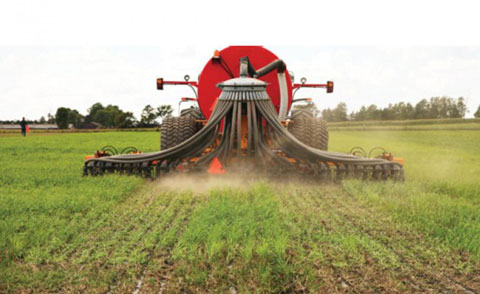



Australia's NFF calls for government action on research warning
Australia's National Farmers Federation is urging the government to take action after research body CSIRO published a report on the risk of increased disease outbreaks.An alarming new report by CSIRO, confirms Australian agriculture is at risk of increased disease outbreaks and pest incursions, weakened exports and damage to our global trading reputation.
The prediction comes after the absence in the October Federal Budget of any meaningful new funding commitment to strengthen the national biosecurity system and following, the failure of the much anticipated biosecurity levy.
National Farmers’ Federation Chief Executive Tony Mahar said the new report – Australia’s Biosecurity Future: Unlocking the next decade of resilience – was a sobering read, which showed that a business-as-usual approach would not meet the challenges of the future and protect Australia from the potentially devastating impacts of exotic pests and diseases.

“A strong biosecurity system is fundamental to the success of Australia’s $60 billion agriculture sector – and to our ambition to grow to $100 billion in output by 2030.
“It is also central to the health of our natural environment, community wellbeing and the economy at large” Mr Mahar said.
“This report clearly demonstrates that Australia needs a more innovative, coordinated and collaborative biosecurity system if it is to keep up with the threat from increasing and severe biosecurity events.”
Mr Mahar said Australia’s biosecurity system was simply too important to compromise.
“We know that the volume and complexity of biosecurity threats will continue to grow. In the five years to 2017, the amount of biosecurity risk materials intercepted in Australia increased by almost 50 percent.
“The biosecurity system must keep pace and this important new report provides expert advice on how the system can be transformed to meet the challenges of the future. The biosecurity system of the future needs to be built on system connectivity – digitisation and enhancing data sharing across supply chains and enabling the role of industry and community in biosecurity responsibility through improved community engagement” Mr Mahar said.
“A single pest or disease incursion has the potential to bring our agricultural industries to their knees, and the COVID-19 experience has brought home the message that biosecurity matters to all Australians, and a biosecurity breach can have far reaching economic, environmental and social consequences.”
The agriculture sector is grappling with the impact of multiple new exotic pest incursions this year, including avian influenza and fall army worm, while the threat of other highly damaging pests and diseases such as African swine fever, khapra beetle, brown marmorated stink bug, foot and mouth disease and Xylella fastidiosa, which have spread around the world, looms large.
“This report is a reminder that all Australians – governments, industry, the community – have a role to play in delivering a strong biosecurity system, and we strongly endorse that message” Mr Mahar said.
“The NFF will continue to call on the Australian Government to step up and ensure that the critical biosecurity functions it delivers to mitigate biosecurity risk at the border and pre-border are adequately resourced, innovative and fit for purpose.”


